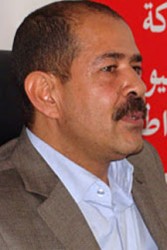TUNIS, (Reuters) – Tunisia’s ruling Islamists dissolved the government and promised rapid elections in a bid to restore calm after the killing of an opposition leader sparked the biggest street protests since the revolution two years ago.
The prime minister’s announcement late yesterday that an interim cabinet of technocrats would replace his Islamist-led coalition came at the end of a day which had begun with the gunning down of Chokri Belaid, a left-wing lawyer with a modest political following but who spoke for many who fear religious radicals are stifling freedoms won in the first of the Arab Spring uprisings.
During the day, protesters battled police in the streets of the capital and other cities, including Sidi Bouzid, the birthplace of the Jasmine Revolution that toppled Zine al-Abidine Ben Ali in January 2011.

In Tunis, the crowd set fire to the headquarters of Ennahda, the moderate Islamist party which won the most seats in a legislative election 16 months ago.
Calls for a general strike today could bring more trouble though Belaid’s family said his funeral, another possible flashpoint, might not be held until Friday.
Prime Minister Hamdi Jebali of Ennahda spoke on television yesterday evening to declare that weeks of talks among the various political parties on reshaping the government had failed and that he would replace his entire cabinet with non-partisan technocrats until elections could be held as soon as possible.
It followed weeks of deadlock in the three-party coalition. The small, secular Congress for the Republic, whose leader Moncef Marzouki has served as Tunisia’s president, threatened to withdraw unless Ennahda replaced some of its ministers.
Yesterday’s events, in which the Interior Ministry said one police officer was killed, appeared to have moved Jebali, who will stay on as premier, to take action.
“After the failure of negotiations between parties on a cabinet reshuffle, I have decided to form a small technocrat government,” he said.
“The murder of Belaid is a political assassination and the assassination of the Tunisian revolution,” he said earlier.
It was not clear whom he might appoint but the move seemed to be widely welcomed and streets were mostly calm after dark.
A leader in the secular Republican Party gave Jebali’s move a cautious welcome.
“The prime minister’s decision is a response to the opposition’s aspirations,” Mouldi Fahem told Reuters. “We welcome it principle. We are waiting for details.”
Beji Caid Essebsi, leader of the secular party Nida Touns, who was premier after the uprising, told Reuters: “The decision to form a small cabinet is a belated move but an important one.”
DIVISIONS
The widespread protests following Belaid’s assassination showed the depth of division between Islamists and secular movements fearful that freedoms of expression, cultural liberty and women’s rights were under threat just two years after the popular uprising ended decades of Western-backed dictatorship.
“This is a black day in the history of modern Tunisia. Today we say to the Islamists, ‘get out’, enough is enough,” said Souad, a 40-year-old schoolteacher outside the ministry.
“Tunisia will sink in blood if you stay in power.”
Ennahda, like its fellow Islamists in Egypt’s Muslim Brotherhood, benefited from a solid organisation that survived repression by the old regime.
And as in Egypt, the Islamists have faced criticism from secular leaders that they are trying to entrench religious ideas in the new state. A constitution is still due to be agreed before a parliamentary election which had been expected by June.





